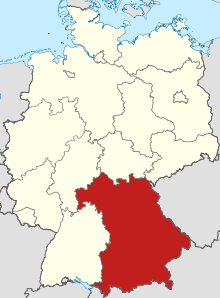The rivalry between the German federal states of Bavaria and Baden-Württemberg,[1][2][3][4] the nation's second- and third-most populous states behind North Rhine-Westphalia, respectively, is a rhetorical rivalry especially regarding their economies and culture.


Bavaria is typically considered to be a very proud state, known for its "Mia-san-mia" (Bavarian for Wir sind wir; English: We are [who] we [are]) motto, which would represent their confident mentality and attitude,[5] while Baden-Württemberg is usually portrayed as a rather modest state.[4] While Baden-Württemberg is generally considered to be more progressive, Bavaria is rather traditional and conservative.[6]
Culture edit
Overall, Bavaria is more culturally popular and influential than Baden-Württemberg. Its culture has become synonymous with Germany in the eyes of many people around the world,[2] and Bavarian traditions and festivals, such as the Oktoberfest,[4] are celebrated worldwide. A popular festival of Baden-Württemberg, although not nearly as popular as the Oktoberfest, is the Cannstatter Volksfest, the second-largest Volksfest after the Oktoberfest.[7]
Bavaria is popular for its football club FC Bayern München, whereas Baden-Württemberg is known for the VfB Stuttgart.
Bavaria is famous for its beer gardens and Bavarian cuisine, which includes traditional food such as schnitzel, sausages, and pretzels. In Baden-Württemberg, the Swabian cuisine is widespread, which is known for dishes such as maultaschen and spätzle.
The state capital cities of Munich and Stuttgart are also their most populous cities and are both vibrant cities in Germany, with each having a significant amount of city culture. Munich has a thriving theater and opera scene, and is home to numerous art galleries and museums, such as the Pinakothek der Moderne and the Deutsches Museum, the world's largest museum of science and technology. Stuttgart is also home to several cultural institutions, such as the Staatsgalerie Stuttgart and the Stuttgart Ballet.
Economy edit
According to a study from the German Economic Institute, Bavaria has the strongest economy of any German state, closely followed by Baden-Württemberg.[8] After North Rhine-Westphalia, by far the most populous state of Germany, Bavaria and Baden-Württemberg have the second and third highest gross regional product (GRP) and the second and third highest number of billionaires,[9] respectively.
Bavaria is home to a number of major global companies, including Siemens, Adidas, and Allianz. The state has Germany's lowest unemployment rate,[10] third-highest exports,[11] third-highest imports (2022),[12] second-highest total research and development expenditure,[13] and third-largest GDP per capita.[14]
Baden-Württemberg is also home to many large and popular companies, such as Bosch, Schwarz Gruppe and SAP. The state has the second-lowest unemployment rate,[10] highest exports[11] and second-highest imports (2022),[12] highest absolute and relative research and development expenditure,[13] as well as the fourth-largest GDP per capita[14] of any German state.
Baden-Württemberg has 277 world market leading companies compared to Bavaria's 211,[2] as well as 14,813 patent registrations versus Bavaria's 12,969,[2] making it the German state with the most patents pending per capita (2020).[15] It also has the second-highest absolute and highest relative number of companies considered "hidden champions".[16] Therefore, Baden-Württemberg is considered the most innovative state of Germany, followed by Bavaria.[17]
Both Bavaria and Baden-Württemberg have a highly developed automotive industry, with Bavaria housing the headquarters of BMW and Audi and Baden-Württemberg having Mercedes-Benz and Porsche. However, Baden-Württemberg has a larger automotive industry; Despite having a lower population, Baden-Württemberg has more workers employed in the automotive industry (240,000 vs 180,000)[2] and more businesses operating in this industry (285 vs 240).[18] In addition, Stuttgart, Baden-Württemberg's capital and most populous city, is often called Germany's "Autohauptstadt" ("car capital city").[19][20][21] It is also home to famous automobile museums like the Mercedes-Benz Museum and Porsche Museum, as well as numerous auto-enthusiast magazines.
See also edit
References edit
- ^ Hägler, Max; Wittl, Wolfgang. "Zwei Rivalen auf denselben Gleisen". Süddeutsche.de (in German). Retrieved 2023-03-16.
- ^ a b c d e Zeitung, Süddeutsche. "Der Süden im Clinch - wer gewinnt?". Süddeutsche.de (in German). Retrieved 2023-03-16.
- ^ deutschlandfunkkultur.de. "Rivalität auf der Südschiene". Deutschlandfunk Kultur (in German). Retrieved 2023-03-16.
- ^ a b c Wörner, Achim. "Bayern oder Baden-Württemberg: Wer ist die Nummer eins im Süden?". stuttgarter-nachrichten.de (in German). Retrieved 2023-03-16.
- ^ "Mia san Mia: What does Bayern Munich's club motto mean?". bundesliga.com - the official Bundesliga website. Retrieved 2023-03-16.
- ^ Schuler, Katharina. "Erfolg, keine Macht". www.zeit.de. Retrieved 2023-03-16.
- ^ "10 Dinge über Stuttgart, die kaum jemand weiß". www.bw24.de (in German). 2023-08-13. Retrieved 2023-08-13.
- ^ "Wirtschaft im Ranking: Bayern behauptet, Sachsen drängt". FAZ.NET (in German). ISSN 0174-4909. Retrieved 2023-03-28.
- ^ "Hamburg und Co: So viele Milliardäre in Ihrem Bundesland". www.manager-magazin.de (in German). 2015-07-07. Retrieved 2023-04-03.
- ^ a b "Arbeitslosenquote in Deutschland nach Bundesländern 2021". Statista (in German). Retrieved 2021-01-01.
- ^ a b "Exportquote in Deutschland nach Bundesländern". www.statistik-bw.de. Retrieved 2021-01-01.
- ^ a b "Wert der Importe nach Deutschland nach Bundesländern 2020". Statista (in German). Retrieved 2021-04-25.
- ^ a b "Forschungs- und Entwicklungsausgaben in Deutschland nach Bundesländern". www.statistik-bw.de. Retrieved 2021-01-01.
- ^ a b "Bruttoinlandsprodukt je Einwohner nach Bundesländern 2021". Statista (in German). Retrieved 2023-03-16.
- ^ "Patentanmeldungen je 100.000 Einwohner in Deutschland nach Bundesländern 2020". Statista (in German). Retrieved 2021-01-01.
- ^ "Hidden Champions: Die Starken aus der zweiten Reihe". iwd (in German). Retrieved 2021-04-02.
- ^ Einwiller, Ruth (2012). "Innovationsindex 2012: Baden-Württemberg im europäischen Vergleich" (PDF). Statistisches Monatsheft Baden-Württemberg 12/2012 (in German).
- ^ Schäfer, Kristina Antonia. "Blick hinter die Zahlen #5: Wo in Deutschland die meisten Jobs an der Autobranche hängen". www.wiwo.de (in German). Retrieved 2023-03-28.
- ^ Friedmann, Jan; Gorris, Lothar (2017-08-11). "Stuttgart: Eine Autostadt auf der Suche nach einer neuen mobilen Zukunft - DER SPIEGEL". Der Spiegel (in German). ISSN 2195-1349. Archived from the original on 17 April 2022. Retrieved 2022-04-17.
- ^ Fischer, Konrad. "Feinstaub und Fahrverbote: In Stuttgart stirbt der Diesel". www.wiwo.de (in German). Archived from the original on 11 April 2021. Retrieved 2022-04-17.
- ^ Hägler, Max. "Vorarbeit aus Stuttgart". Süddeutsche.de (in German). Archived from the original on 17 April 2022. Retrieved 2022-04-17.